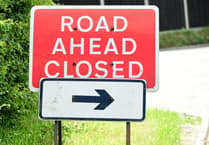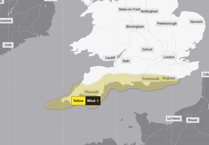A CREDITON veterinary practice is urging dog and cat owners to keep toxic treats out of the reach of their pets to help avoid an emergency trip to the vets this Easter.
Vets see a surge in the number of pets suffering from chocolate poisoning over the Easter period, while other seasonal human treats can also be harmful to pets.
To help keep dogs safe, Jonathan Wood Vets, which has surgeries in Barnstaple Cross, Crediton, and at Bernaville Nurseries in Cowley, is urging owners to keep them away from chocolate eggs and other tempting foods such as sweets, hot cross buns and leftovers from roast dinners as they can all be potentially fatal if eaten.
Chocolate is toxic to pets because it contains a substance called theobromine that dogs cannot break down. The darker the chocolate, the higher the theobromine content, and even small amounts can cause illness. The smaller the dog, the less they need to eat to be poisoned.
Raisins and sultanas in teacakes, hot cross buns and simnel cake can also be poisonous to pets, while the traditional Easter Sunday roast dinner can lead to problems such as gastroenteritis or choking on bones.
Vet Lizzy Linney, one of Jonathan Wood Vets’ clinical directors, said: “We see a higher number of chocolate poisoning cases at this time of year and I would urge owners to keep Easter treats well out of reach of their pets.
"While we do hear of well-meaning owners treating their pets with chocolate, most of the poisoning cases we see have involved dogs sniffing out Easter eggs and helping themselves. If you do have chocolate in the house, lock it away or put it up high where your pet can’t get to it.
“If you suspect your pet has eaten something toxic, call your veterinary practice straight away and, if possible, let them know what they’ve eaten and how much. They will be able to give you advice over the phone and tell you if you need to take your pet in for treatment.”
Symptoms of chocolate poisoning may include vomiting, diarrhoea and increased heart rate, and it can lead to fits and cardiac failure.
Some people may receive sweets as Easter gifts instead of chocolate, but be aware that many of these contain an artificial sweetener called xylitol that can cause vomiting, drowsiness, collapse and fits in dogs.
Lizzy also advises against giving your pet some of your traditional Easter roast as lamb is rich and fatty and can increase the risk of gastroenteritis and occasionally lead to pancreatitis.
Lizzy added: “Even the most well-behaved pets can be tempted to steal food, so make sure they can’t reach the tops of cookers or kitchen worktops and that bins containing leftovers aren’t accessible.”
To help everyone enjoy a happy Easter, Jonathan Wood Vets has come up with eight useful tips for pet owners:
1. Keep Easter eggs out of reach of your dog as chocolate can cause hyperactivity, an elevated heart rate and seizures.
2. Don’t let dogs eat hot cross buns because the grapes, raisins, currants and sultanas they contain are toxic to pets. 3. Flowers are popular Easter gifts, but they can make pets very ill. Daffodils, tulips and crocuses are toxic, especially if dogs dig up and eat the bulbs, while lilies can cause excessive salivation (drooling), lethargy, vomiting and kidney failure in cats.
4. Keep stuffed cuddly toy bunnies and chicks and plastic toys away from dogs because they can be chewed or swallowed, causing choking or blockages. 5. Turkey, chicken, lamb, beef and pork bones that have been cooked splinter easily and can perforate your dog’s stomach or cause choking. They are dangerous and should never be fed to dogs. 6. Avoid feeding scraps from the table. Rich, fatty foods can result in vomiting or diarrhoea and lead to an increased risk of pancreatitis, a painful and serious condition.
7. Keep onions and garlic - powdered, raw, cooked, or dehydrated - away from your dog and be aware that foodstuffs such as stuffing can contain these ingredients. They can cause vomiting, diarrhoea and anaemia.
8. Prevent pets having access to alcohol as it can cause serious liver damage.




